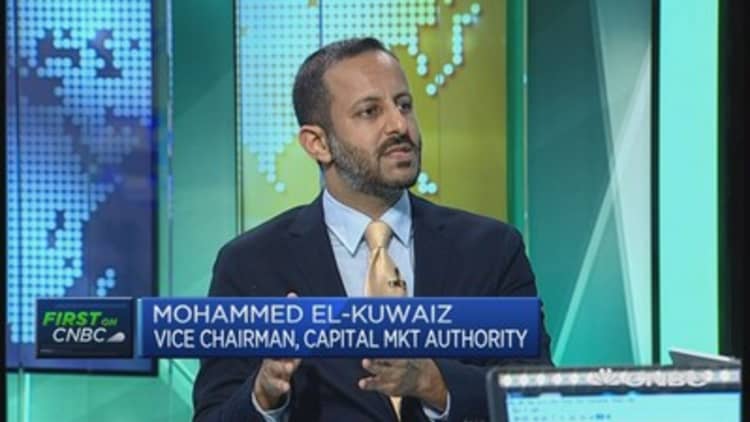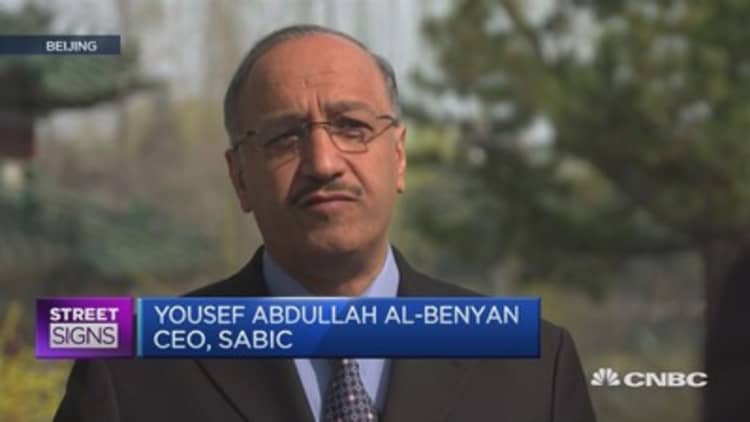Saudi Aramco may be the object of intense worldwide speculation, as investment banks and global stock exchanges salivate at the prospect of the expected largest IPO ever, but Saudi Arabia actually has much more than its oil sector to offer investors.
And the state energy giant, which is expecting to raise as much as $100 billion as it lists a small portion of the company next year, is part of the kingdom's plan to unlock its hidden economic treasures.
"The money that will come in is not money they'll put in the bank at 2 percent interest," said Tom McNulty, a director specializing in the energy sector at Navigant Consulting. "It's for turning one industry into 10 to 12 industries."
This diversification away from oil is the reason why King Salman bin Abdulaziz recently spent a month in Asia, signing multi-billion dollar deals with Indonesia, Malaysia, China and Japan. The kingdom's government is now pushing for more public-private partnerships, and Saudi Arabia says it wants to increase foreign direct investment from the current 3.8 percent to 5.7 percent of GDP by 2030.
"We see utilities, airports, health care and real estate holding the best opportunities from the point of view of public-private partnerships," said Saleem Khokhar, head of fund management at National Bank of Abu Dhabi.
As the kingdom opens its door wider to foreign investors, here's where other opportunities lie:
Mining
It's not just oil buried in Saudi Arabia's land: The country has a treasure trove of other natural resources.
"It has promising sites of minerals such as gold, silver, copper, iron, platinum and other strategic materials," said Jaap Meijer, head of equity research at Arqaam Capital, an emerging markets investment bank based in Dubai.
In fact, Alcan Primary Metal Group, a Rio Tinto subsidiary, and the Saudi Arabian Mining Company recently signed a $7 billion joint venture agreement to mine bauxite reserves in the northern part of the kingdom. The plan is to produce 720,000 tons of aluminum per year.
"I remember when I was there, everyone would say how rich the country is with other resources," said Mark Keenan, who used to invest for members of the Saudi royal family and is now managing director and head of commodities research in Asia for Societe Generale. "To mine this stuff, you need to be a BHP or a Rio."
Renewable energy
The kingdom's road map to diversify away from oil is spelled out in its Saudi Vision 2030 plan, in which it acknowledges that "we still lack a competitive renewable energy sector at present."
One near term goal is to maximize solar and wind power in the country by generating 9.5 gigawatts of renewable energy.
Germany's Phoenix Solar has a head start in Saudi Arabia. In 2012 and 2014, the photovoltaics company built two solar panel parks on the site of the kingdom's petroleum research center in Riyadh. Saudi Aramco ordered the 3.5 megawatt and 1.8 megawatt solar parks.
And Phoenix Solar has seven to eight more projects in the pipeline in Saudi Arabia, according to Klaus Friedl, managing director for Phoenix Solar Oman, which is executing the projects. Looking ahead, he said that upcoming competition in the country doesn't worry him.
"There is real competition with about 20 to 30 companies who might be interested and submit bids for upcoming tenders. But in reality, the maximum is 10 competitors who are really in a position to win," said Friedl. "You need at least Saudi Arabian or GCC experience. You need at least a few power plants as reference projects and you need financial facilities for Saudi bonds."
Capital markets
One key to growing the economy is opening up the capital markets. The Saudi Stock Exchange — also called the Tadawul, which means "trading" in Arabic — has a market capitalization of more than $400 billion reflected in the Tadawul All Share Index. All of the 176 listed names are Saudi companies.
Mohammed El-Kuwaiz, vice chairman of the Capital Market Authority, regulates the exchange and envisions a day when foreign companies can list.
"The Saudi capital market was an island unto itself. It was viewed as targeting local issuers and investors," El-Kuwaiz recently told CNBC.
Right now, the only way a foreigner can invest in the Saudi equity market is by registering as a Qualified Foreign Investor (QFI), and the conditions are restrictive. Those foreign investors are generally large financial institutions or fund managers that must have at least 3.75 billion Saudi riyals ($1 billion) in assets under management.
QFIs — including HSBC, which was one of the first foreign institutions to get the Saudi license — will have the right to subscribe in IPOs on the Tadawul, which is where Saudi Aramco is expected to have its primary listing.

In February, the Saudi Stock Exchange launched a parallel market called Nomu, which has "lighter listing requirements" for domestic companies that want to go public. The Nomu, which means "growth" in Arabic, has seven listed companies with a total market cap of $518 million. After two years on the parallel market, a company may qualify to list on the main Tadawul index. These companies are also open to QFI investors.
Challenges
While several sectors may seem promising to investors, opening up the Saudi economy means changing several entrenched traditions. For example, allowing more women in the workforce or meeting Western expectations of transparency.
"Saudi is like a family business," said Keenan of Societe Generale. "It's not like they publish reserves — nor do they need to. They're perfectly happy producing oil. No one's gone in there and done feasibility studies."
That is about to change as engineering audits are reportedly underway in Saudi Arabia to determine the value of Aramco's oil reserves. "It's the first fresh clean look in a long time," said Navigant's McNulty.

"The biggest challenges are access to credit, Saudization policies (requirements to hire locals) and the lack of skills among the domestic workforce," said Jaap Meijer of Arqaam Capital.
A major stumbling block has been the upgrading of skills: It's challenging to wean a population off of comfortable government jobs and generous subsidies. But two years of low oil prices is a reality check for the country.
Saudi Arabia's economic overhaul leans on the hope that non-governmental employment will grow quickly as the kingdom wants to increase the private sector's contribution from 40 percent to 65 percent of GDP.
"They don't want a country where the government employs two-thirds of their own people," said McNulty. "The expectation is the private sector will offer better salaries or better career advancement."
Correction: This story was revised to correct that Friedl is managing director for Phoenix Solar Oman.


